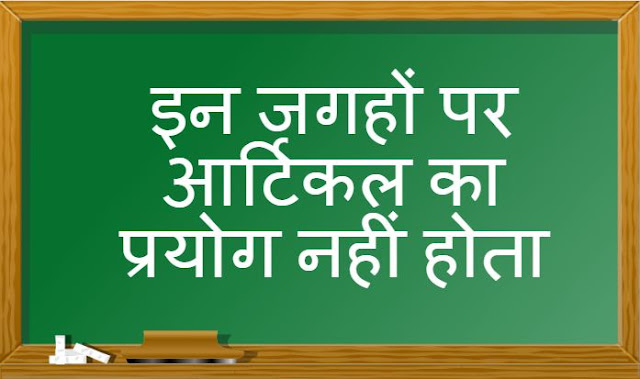इन जगहों पर आर्टिकल का प्रयोग नहीं होता – Article is not used in these places

Contents
- 1 इन जगहों पर आर्टिकल का प्रयोग नहीं होता – Article is not used in these places
- 1.1 Places Where Articles (“A,” “An,” “The”) Are Not Used
- 1.2 1. Proper Nouns
- 1.3 2. Names of Languages and Subjects
- 1.4 3. Names of Meals (Breakfast, Lunch, Dinner)
- 1.5 4. Names of Sports and Games
- 1.6 5. Names of Diseases (Mostly)
- 1.7 6. Names of Academic Degrees
- 1.8 7. Names of Places When Used in a General Sense
इन जगहों पर आर्टिकल का प्रयोग नहीं होता – Article is not used in these places
- किसी भाषा रंग तथा विषय के पहले आर्टिकल (Article) का प्रयोग नहीं किया जाता है
- जैसे – He is a teacher of Hindi
- किसी बीमारी के नाम से पहले सामान्यतया आर्टिकल (Article) का प्रयोग नहींं किया जाता है
- जैसे – He is suffering from fever
- लेेकिन निम्नलिखित बीमारियों के नाम से पहलेे आर्टिकल (Article) The का प्रयोग किया जाता हैै
- जैसे – The Plague, The measles,
- द्रव्यवाचक संज्ञा तथा भाववाचक संज्ञा के पहले आर्टिकल (Article) का प्रयोग नहीं किया जाता है
- जैसे – We drink water
- लेकिन इन Nowns को Definite करना हो तो इनके पहले आर्टिकल (Article) The का प्रयोग किया जाता है
- जैसे – The gold of Alk,s ring is not pure
- दिनों महीनों त्योहारों के नामों के पहले आर्टिकल (Article) का प्रयोग नहीं किया जाता है
- जैसे – She come on monday
- किसी खेेल केे नाम से पहले आर्टिकल (Article) का प्रयोग नहीं किया जाता है
- जैसे – She play cricket
- कुछ Nouns के पहले आर्टिकल (Article) का प्रयोग उस स्थिति में किया जाता है जब वहॉ जाने का उदृेश्य वही हो जिसके लिए इसका निर्माण किया गया है
- जैसे – School, college, university
- लेकिन यदि इन स्थानों पर जाने का उदृेेश्य कोई दूसरा हो तो इसके पहले आर्टिकल (Article) The को प्रयोग किया जाता है
- जैसे – The college is near SUCCESS POINT
Places Where Articles (“A,” “An,” “The”) Are Not Used
Articles (a, an, the) are not used in the following cases:
1. Proper Nouns
We do not use articles before names of people, specific places, and countries.
Example:
-
Incorrect: The John is my friend.
-
Correct: John is my friend.
-
Incorrect: I visited the India last year.
-
Correct: I visited India last year.
Exception: Some country names that include words like “United” or “Kingdom” take “The.”
The United States, The United Kingdom, The Netherlands
2. Names of Languages and Subjects
Articles are not used before languages and academic subjects.
Example:
-
Incorrect: I am learning the English.
-
Correct: I am learning English.
-
Incorrect: She studies the Mathematics.
-
Correct: She studies Mathematics.
3. Names of Meals (Breakfast, Lunch, Dinner)
We do not use articles before general meal names.
Example:
-
Incorrect: I had a dinner.
-
Correct: I had dinner.
-
Incorrect: She invited me for the lunch.
-
Correct: She invited me for lunch.
Exception: If describing a specific meal, “the” can be used.
The dinner served at the wedding was delicious.
4. Names of Sports and Games
Articles are not used before sports or games.
Example:
-
Incorrect: He plays the cricket.
-
Correct: He plays cricket.
-
Incorrect: I love the chess.
-
Correct: I love chess.
5. Names of Diseases (Mostly)
Articles are usually not used before disease names.
Example:
-
Incorrect: She is suffering from the cancer.
-
Correct: She is suffering from cancer.
-
Incorrect: He has the diabetes.
-
Correct: He has diabetes.
Exception: Some diseases like “the flu” and “the measles” take “the.”
6. Names of Academic Degrees
Articles are not used before degree names.
Example:
-
Incorrect: He completed the MBA.
-
Correct: He completed MBA.
-
Incorrect: She has the PhD in Physics.
-
Correct: She has a PhD in Physics. (Uses “a” because “PhD” starts with a consonant sound.)
7. Names of Places When Used in a General Sense
Articles are not used before some common places when they refer to their general function.
Example:
-
Incorrect: She goes to the school every day.
-
Correct: She goes to school every day. (General purpose: studying)
-
Incorrect: He is in the prison.
-
Correct: He is in prison. (General meaning: as a prisoner)
Exception: If referring to a specific place, “the” is used.
The school near my house is big. (A particular school)
Would you like more examples or clarification?
